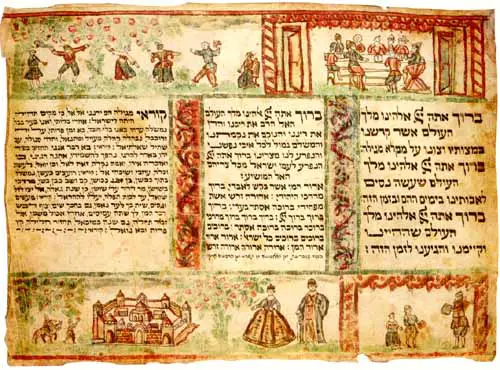 |
| An Illustrated Megillah |
Today at the Shabbat Women's class I've been going to pretty much every Shabbat for over thirty-four years, we had a "Pre-Purim" talk. It was actually by one of the younger women who has lived in Shiloh all her life and was a toddler when these classes began. I'm happy to say that there are lots of amazing people who were raised in Shiloh, and some of them have decided that Shiloh is great enough to raise their own kids here.
Well, we had this discussion about women in general and Queen Esther in particular. My reflections on it are mine and probably a distortion of the talk, but that's me.
The name Esther אסתר mean "hidden." And that in many ways is her role. Like many women, she plays second fiddle to the men. Mordechai, her relative, was the public Jew. He sat at King Achashverosh's gate and was well-known. He sent Esther to the "competition" to choose a new queen and told her to keep her Jewish identity a secret. She did, and she was chosen to be the next queen. Mordechai basically planted her as a "sleeper" agent.
But don't think that being a queen was such a great deal. Basically she was just to be kept beautiful for formal occasions. She was to be seen and not heard. She lived with the other women, kept beautiful just in case King Achashverosh needed a woman.
King Achashverosh was under the influence of Haman who hated Mordechai. So when Haman decided to not only kill Mordechai but to include all his Jewish brethren, King Achashverosh gave him full authority. That's when Mordechai's plan for Esther had to be activated. And that's when the puppet became the puppeteer. It was Esther, the hidden sleeper, who gave the orders and did the daring acts that saved the Jewish People.
And then, instead of being a real powerful queen, she went back into the the women's quarters and Mordechai retook his role as leader.
6 comments:
Actually, Esther was hiding out while the king was searching for a new wife. When she was found out, she had no choice and Mordechai prepared her for this new episode in her life and was always outside the palace gates watching out for her; Mordechai realized that she was put in that position to save the Jewish people. Achashveirosh was also evil, but Haman (the Amalekite) was obsessed with his hatred for the Jewish people. It's all a mashal, teaching us that even when Hashem is hidden, He is the One pulling the strings, all the time.
Yes, Gd is hidden too in this Holy Book.
I am interested to learn that this wonderful story of Ester has a common understanding as a "mashal" or parallel.
Her hour came when as queen she dared to enter unsummoned into the presence of the king to make supplication for her people when told of Haman's plot to destroy the Jews.
I wonder whether the prophet Zechariah could be speaking of the fulfilment of this allegory in Ester when he writes,
“It shall be in that day that I will seek to destroy all the nations that come against Jerusalem. “And I will pour on the house of David and on the inhabitants of Jerusalem the Spirit of grace and supplication..
JS, Esther's "grace" is חן "chen" which isn't a physical beauty; it's a spiritual beauty or charisma. And that is how Esther is described and that is how she was able to "the king's" inner chambers unscathed. It's a confidence, a magnetism Gd given and used only when needed.
Also, to JS, the story of Purim took place outside of the Land of Israel; it took place in Persia, not Jerusalem. The Prophet's prophecy is about the nations gathering to go up against Jerusalem! Differnt time (time will come), different place.
Thank you for your responses to my comment, but as a non-Jew I still remain somewhat puzzled. Perhaps it is because I chose to use your word "mashal" thinking (seemingly wrongly)that it can mean an allegory or a type that can have replication in another time and place.
Nebuchadnezzar's vision of the composite image spoke of then-present and future kingdoms. The following Medo-Persian, Greek and Roman empires were the fulfilment of this allegorical image.
My question now is, could Queen Esther be portraying some very significant future supplication by the Jewish nation in the light of those words of Zechariah?
They have dug a pit before me;
Into the midst of it they themselves have fallen.(Psalm 57)
If Haman was hung on his own gallows, one wonders what will be determined for the next would-be executioner/s of the Jews when God heeds the supplication of His people.
Thank you for your patience.
Post a Comment